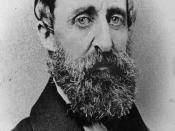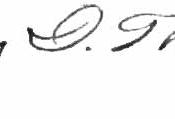Virtue is in the Middle
"Simplicity, simplicity, simplicity!" The one word that sums up Henry David Thoreau's answer as to why he went to the woods. Such a significant phrase was uncommon and especially outdated during the peak of the Industrial Revolution when he wrote it. With light bulbs replacing candles and locomotives replacing horses, life for the average man began to get easier. Or did it? In his essay "Why I Went to the Woods", Thoreau explains that material inventions not only fail to simplify our lives, but actually complicate them. Indeed, material goods might ease one aspect of our life, but at the same time they often tie up the rest of our lives. Take a dad who buys a new cell phone. On the one hand, he can make calls a lot easier; on the other, his boss can reach him a lot easier (while the dad is at his son's baseball game).However,
Thoreau's view seems to be the extreme, and I believe he goes too far. I agree with Aristotle that virtue is in the middle.
Thoreau believes that our lives are too cluttered with detail, and that we should reduce life to its lowest terms - namely, we should keep our activities few. He says, "An honest man has hardly need to count more than his ten fingers, or in extreme cases he may add his ten toes, and lump the rest." Railroads may seem like an advantage, but to Thoreau, they are not worth the amount of work put in to build and maintain them. While railroads can get us from point A to point B faster, their net effect is to reduce, not increase man's free time or his happiness. Thoreau says that "we do not ride upon the railroad; it rides...


